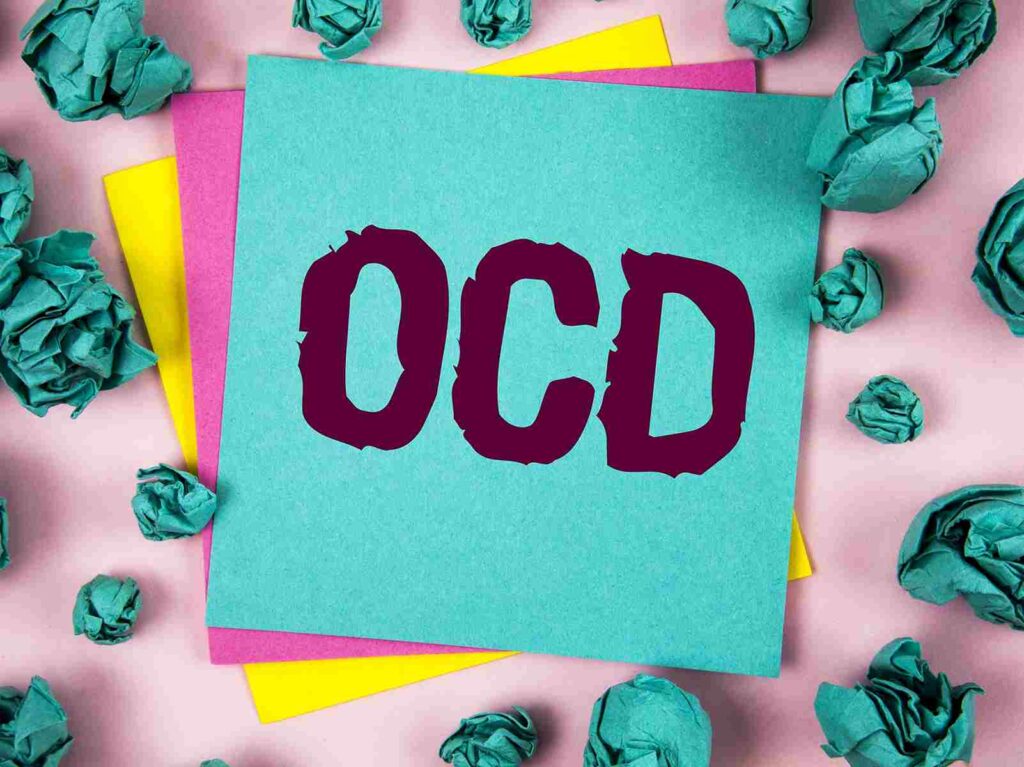Do you ever find yourself repeating the same words over and over again? Maybe it’s just a few words, or maybe it’s an entire sentence. If this sounds familiar, you might be experiencing OCD repeating words. This is a type of OCD that can be very frustrating and difficult to stop. In this blog post, we will discuss what causes OCD to repeat words, as well as some tips on how to stop it.
Contents
What Is OCD Repeating Words?
 OCD repeating words are described as a sub-type of OCD that is characterized by a compulsion to repeat words or phrases either out loud or internally. This can be done in response to intrusive thoughts or as a way to neutralize or cancel out the thoughts. It is also known as “verbal tic OCD.”
OCD repeating words are described as a sub-type of OCD that is characterized by a compulsion to repeat words or phrases either out loud or internally. This can be done in response to intrusive thoughts or as a way to neutralize or cancel out the thoughts. It is also known as “verbal tic OCD.”
For example, if someone with OCD repeating words has an intrusive thought about harming their child, they may feel the need to say, “I would never hurt my child” out loud or over and over again in their head. Also, it is believed that this compulsion is an attempt to gain control over intrusive thoughts.
This repetition of words is a type that is also known as “verbal compulsions.” Verbal compulsions are often done in an effort to reduce anxiety or calm the individual down. Other types of compulsions include counting, tapping, and hand-washing. OCD repeating words is generally a distressing and time-consuming condition that can interfere with daily activities and functioning.
It is important to understand that people with OCD are not actually trying to be annoying or difficult, they are genuinely struggling and seeking relief from their symptoms. If you think that someone you know may be struggling with OCD repeating words, it is important to be supportive and understanding.
What Are The Signs And Symptoms?
There are several ways to identify the OCD repeating words, some of these include:
- need to repeat words or phrases out loud or in your head
- anxious or stressed if you don’t repeat the words or phrase
- try to stop the urge to repeat but failing
- repeat words or phrases takes up a lot of time during the day
- avoid saying certain words or names because you’re afraid of repeating them
- feel like you can’t control your thoughts
The signs and symptoms can be difficult to recognize because this might be the first time you’re experiencing them. It’s important to be patient with yourself and understand that it takes time to learn how to manage OCD by repeating words.
Moreover, studies have suggested that people who have OCD might be more likely to have other mental health conditions, such as anxiety and depression. This means that if you’re experiencing any of the symptoms above, it’s important to reach out to a mental health professional for help. Otherwise, it can be easy to fall into a negative spiral of thoughts and behaviors.
Causes And Risk Factors
 OCD repeating words is generally caused by a combination of genetic and environmental factors. People with OCD are more likely to have relatives with the disorder, which suggests that there is a genetic component. Environmental factors may include stressful life events or trauma.
OCD repeating words is generally caused by a combination of genetic and environmental factors. People with OCD are more likely to have relatives with the disorder, which suggests that there is a genetic component. Environmental factors may include stressful life events or trauma.
For example, one theory suggests that people with OCD may have an overactive fear response, which is then reinforced by avoiding the feared object or situation. This avoidance leads to more anxiety and further reinforces the cycle of OCD. Also, genetic factors and environmental factors are likely to interact and contribute to the development of OCD.
In addition, there are some other risk factors that are responsible for developing OCD such as:
- Having another mental disorder, such as anxiety, depression, or Tourette syndrome
- History of having language disorder, such as aphasia
- Having a family member with OCD
- Experiencing trauma or stress in life
- Using certain drugs, such as LSD or MDMA (ecstasy)
Previous research has shown that people with OCD are more likely to have relatives with the disorder, which suggests that there is a genetic component. Overall, the causes can be anything to do with your genes, environment, or previous experiences.
How Does It Impact Life?
It is believed that people with OCD tend to have higher levels of anxiety and stress in their lives. This, in turn, can lead to a number of different problems. And when it comes to OCD repeating words then it can become quite debilitating. Some of the consequences can be:
- one can’t think straight or concentrate on anything else
- can cause a great deal of anxiety
- interfere with work, school, and personal relationships
- lead to depression
- isolates the sufferer
So, these are some negative impacts that OCD repeating words can have on a person’s life. But, it is important to remember that everyone experiences this disorder differently. And, there are many people who live relatively normal lives despite having OCD.
In fact, studies have shown that people with OCD are just as likely to be successful in their careers as those without the disorder. So, if you or someone you know is struggling with OCD repeating words, know that there is hope. There are treatments available that can help lessen the symptoms and improve the quality of life.
How To Diagnose?
 The diagnosis of mental disorders is often tricky and complicated. Only a professional can give you a 100% accurate answer. However, there are certain symptoms that, if present, may indicate that you have OCD.
The diagnosis of mental disorders is often tricky and complicated. Only a professional can give you a 100% accurate answer. However, there are certain symptoms that, if present, may indicate that you have OCD.
Do you:
- Feel the need to perform certain rituals or routines over and over again?
- Have persistent and unwanted thoughts that make you feel anxious or stressed?
- Act out certain behaviors in order to relieve your anxiety or stress?
If you answered yes to any of the above, you may have OCD. Moreover, the diagnosis of OCD repeating words consists of two main criteria:
- one is where the person experiences obsessions, and
- the other is where the person experiences compulsions.
It requires a complete evaluation of symptoms and then, usually, a physical exam to rule out any other possible causes of the symptoms. If you think you may have OCD, please see a mental health professional for an evaluation.
Treatment Options For OCD Repeating Words
There are many ways to treat OCD repeating words, and the most effective approach depends on the individual. Some people may benefit from medication, while others may find that cognitive behavioral therapy is more effective. Let’s further explore each of these treatment options.
Medication
Medications are often used to treat OCD, and they can be very effective. The most common type of medication used to treat OCD is a selective serotonin reuptake inhibitor (SSRI). SSRIs work by increasing the level of serotonin in the brain, which can help to reduce OCD symptoms. Also, medications can be used in combination with therapy to provide the best results.
Because this can cause side effects in some people, it’s important to talk to your doctor about the risks and benefits of taking medication. In addition, it’s important to work with a mental health professional who can help you manage your OCD symptoms. With time you will be better equipped to manage your OCD and live a full life.
Cognitive Behavioral Therapy
Cognitive behavioral therapy (CBT) is a type of psychotherapy that can be very effective in treating OCD. CBT works by helping you to change the way you think about your obsessions and compulsions. This can help to reduce your OCD symptoms and improve your quality of life. As a therapist will help you to understand your OCD repeating words. And how to stop it.
CBT usually involves learning about OCD and how it works. You will also learn some specific tools and strategies to help you manage your OCD symptoms. It mainly focuses on helping you to change your thoughts and behaviors related to your OCD. For example, if you are compulsively repeating words and phrases, your therapist may help you to understand why you are doing this. They may also teach you some specific tools to help you stop the compulsion.
Exposure and response prevention therapy (ERP)
 It is the most effective treatment for OCD. This type of therapy involves gradually exposing yourself to the things that trigger your OCD while learning to resist the urge to perform your compulsions. For example, ERP might involve touching a doorknob and then deliberately not washing your hands afterward.
It is the most effective treatment for OCD. This type of therapy involves gradually exposing yourself to the things that trigger your OCD while learning to resist the urge to perform your compulsions. For example, ERP might involve touching a doorknob and then deliberately not washing your hands afterward.
You work with a therapist to come up with a list of activities that trigger your OCD. The therapist then helps you work through the list, starting with the least triggering activities. As you get better at resisting your compulsions, you work your way up to more difficult tasks.
ERP can be a very effective treatment for OCD, but it can also be challenging. It requires a lot of time, effort, and commitment. But if you stick with it, you can see a significant reduction in your OCD symptoms.
Join a support group
Support groups are a great way to share your experiences with others who understand what you’re going through. It helps you feel less alone and can give you some helpful tips on how to deal with your OCD. There are many online and in-person support groups available. Do some research to find one that’s right for you.
Because if you want to know every single detail about what’s going on in your head. Then, there’s a lot to unpack when it comes to OCD. But knowledge is power, and the more you know about your disorder, the more control you’ll have over it.
Self-help tips
This is a difficult behavior to break on your own. But along with professional help, you can try some self-help tips:
- Avoid avoidance. It might be tempting to try to avoid thinking or saying the words that trigger your OCD, but this can actually make the problem worse.
- Challenge your beliefs. If you’re convinced that something bad will happen if you don’t repeat the words, try to come up with evidence that disproves this belief.
- Focus on what you can control. Instead of worrying about the words you can’t control, focus on the words you can control.
- Find a healthy outlet. When you’re feeling stressed or anxious, find a healthy outlet for that energy, such as exercise, journaling, or spending time with friends.
- Talk to someone you trust. Talking to someone you trust about your OCD can help you feel supported and understood.
- Take care of yourself. This is a difficult battle, so make sure to take care of yourself. Eat healthy, exercise, and get plenty of rest. Also, you must be patient. Breaking an OCD habit can take time and effort. But it’s possible to overcome OCD with the right treatment and support.
If you’re struggling with OCD repeating words, know that you’re not alone. There are many people who understand what you’re going through and can offer support. You should understand your condition and seek professional help to get the best possible treatment. With time and effort, you can overcome OCD repeating words and living a happy, healthy life.
Conclusion
To conclude, OCD repeating words are simply a manifestation of the condition itself. A person with this symptom may feel the need to repeat words or phrases out loud in order to ease their anxiety. However, this only serves to reinforce the negative thoughts and behaviors associated with OCD. If you or someone you know is struggling with this symptom, there are treatments available that can help.
Moreover, people with OCD often realize that their thoughts and behaviors are irrational, but they cannot control them. If you are struggling with OCD, know that you are not alone and you can get help. There are many resources available, such as hotlines, support groups, and therapy. Do not hesitate to reach out for help.
You can also contact Therapy Mantra for more information and help with OCD repeating words. We have a team of professional therapists who can provide you with the support and guidance you need to recover from this condition. Contact us today to learn more about our services. You can also book an online therapy or download our free OCD treatment app on Android or iOS.


